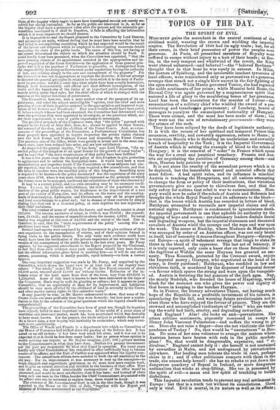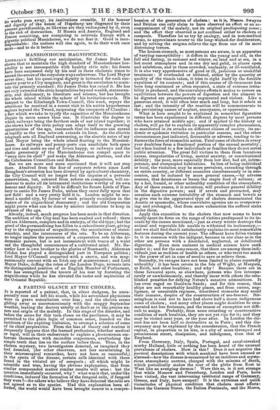TONGS OF THE DAY.
THE SPIRIT OF EVIL.
Miscssitsi gains the ascendant in the central continent of tio civilized world, wearing the crown and wielding the imperial sceptre. The Revolution of 1848 had its ugly traits ; but, for all their errors, in their brief possession of power the peoples were generous. At Paris, all proscribed members of Royalty were suffered to escape without injury to a hair of their heads ; at Bet. lin, in the very tempest and whirlwind of the revolt, the King went abroad unharmed—and believed !—the " beloved Berliners" thought that in that hour he was surely in earnest. In Milan, the horrors of Spielberg, and the intolerable insolent tyrannies of local officers, were remembered only as provocatives to a generous revenge that struck not a single blow except in the fair fighting of the open streets. While Manin governed Venice, she had regained the noble sentiments oilier prime ; while Mazzini held Rome, the Eternal City was again governed by a magnanimous spirit that restored a life of glory to the mouldering bones of her greatness. Loud has been the execration for the murder of Latour—the assassination of a military chief who wielded the sword of a pre- varicating and treacheisus government ; of Lemberg, bearer of messages to paralyze the emancipated nationality of Hungary. Those were crimes, and the most has been made of them ; but they were not the acts of revolutionary governments—they were the crimes of the mob.
They have been eclipsed by the deeds of legitimate authority. It is with the return of her spiritual and temporal Prince that meanness, servility, and cowardly: oppression return to Rome; it is victorious Russia who is dictating an unchristian and cowardly breach of hospitality to the Turk ; it is the Imperial Government of Austria which is setting the example of blood to the rebels of Hungary ; it is the renewal of "order" in France which opens the way for a cruel and jesuitical treachery. Prussia and Aus. tria are negotiating the partition of Germany among them—and then, Heaven help patriots or peoples 1
It is not alone the cruelty of the ascendant powers which is to be deplored, but the lamentable moral and material effects that must follow. A bad spirit rules, and its influence is mischief. Austria is teaching the Hungarians, and all nations attempting to change the form or policy of their institutions, that victorious governments give no quarter to chivalrous foes, and that the only safety for nations that rebel is war to extermination. Hun- gary would now be safer if the rebels of Austria and Bohemia had brought the whole Royal Family and its adherents to the block— that is the lesson which Austria has recorded in letters of blood. Batthyani attempted to reconcile new imperial claims and old national rights : Batthyani is condemned to ignominious death. An imperial government is one that upholds its authority by the flogging of boys and women: revolutionary leaders disdain brutal and degradinssb weapons, but the imperial statesmen and decorated cavaliers of Austria wield the scourge and the rope and war upon the weak. The scene at Ruskby, where Madame de Maderspach was scourged by order of an Austrian officer, was not only brutal in itself, but of necessity it rouses throughout Hungary—through- out Europe—a spirit of vehement revenge that longs to slake its thirst in the blood of the oppressor. The last act of leniency, if it is truly reported, only casts a baser slur on these ferocities: to the fugitives at Widdin the same Haynau has granted an am- nesty. Thus Kossuth, protected by the Crescent sword, enjoys the Imperial mercy ; Goergey, who negotiated at the head of an army, is freely pardoned ; Batthyani who confided in law and chivalrous faith, is murdered by the dispenser of Imperial favour —a favour which spares the strong and wars upon the vanquish- ed. Austria is fostering the bad passions of the dark ages. Nay, the manly Rudolph, who founded the house of Hapsburg, would blush for the recreant son who gives the power and dignity of that house in keeping to the hatcher, Haynau.
So in France, the literary adventurer Tillers, not having much hope of the Republic as a profitable investment of his talents, is speculating for the fall, and warning future revolutionists not to trust those who have enjoyed the favour of princes. They are the crowned and accomplished vindicators of" order" who are teach- ing the world bad faith, cruelty, and degrading cowardice.
And England ? Alas she looks on and—prevaricates. She utters sublime sentiments, piquantly composed in essays by Henry John Viscount Palmerston—and suffers the wrong to go on. Does she not raise a finger—does she not vindicate the inde- pendence of Turkey ? No, that would be " uncourteous " to Rus- sia. Do none of her sons volunteer to avenge the matron whom Austrian heroes have beaten with rods in the „public market- place ? No, that would be disagreeable, expensive, and " ri- diculous." England cannot help it : she herself is not unstained by cowardice at Malta, and not undisgraced, by prevarication anywhere. Her leading men tolerate the trade in cant, perhaps share in it ; and if other politicians compete with them in the trade, she cannot help herself: she has no rebuke to put down the dangerous quackery of Repeal in Ireland, or more dangerous nationalism that winks at crop-lifting. She too is possessed by the spirit of 'evil—a mean and low spirit of truckling to holder diabolisms.
This Imperial revolution tends to prevent any real settlement in Europe : but that is a truth not without its consolations. Good only is vital. Evil is mortal, in its nature as ivell.sts its effects Re works pass away, its ,itp,titutions crumble. If the honour and dignity Of the houses of Hapsburg are IclikgraCed by their present guardianship, sO likewise are they endangered by it, even to the risk of destruction. If Russia and Austria, England and France conniving, are conspiring to reinVade Europe with a gigantic political Manicheism, we do not fear it. Good is inex- tinguishable: the nations will rise again, to do their work once more—and to do it better.

























 Previous page
Previous page